Report on Leadership and Management Practices at Holiday Inn Hotels
VerifiedAdded on 2023/01/18
|16
|5404
|49
Report
AI Summary
This report provides a comprehensive analysis of leadership and management practices within the context of the Holiday Inn hotel chain. It begins by exploring classical management theories and their application in the service industry, specifically addressing bureaucratic, scientific, and administrative management. The report then delves into the roles of leaders and various leadership styles, including autocratic, participative, and laissez-faire approaches, examining their relevance within the service sector. A significant portion of the report is dedicated to analyzing Holiday Inn's specific leadership and management styles, highlighting the use of transformational and participative leadership. It further examines the influence of internal and external environmental factors on management styles, along with an assessment of required hard and soft management skills. The report also investigates future management and leadership skills necessary for the service sector and compares different change management systems and their impact on leadership, culminating in a concluding overview of the key findings and implications for the organization.
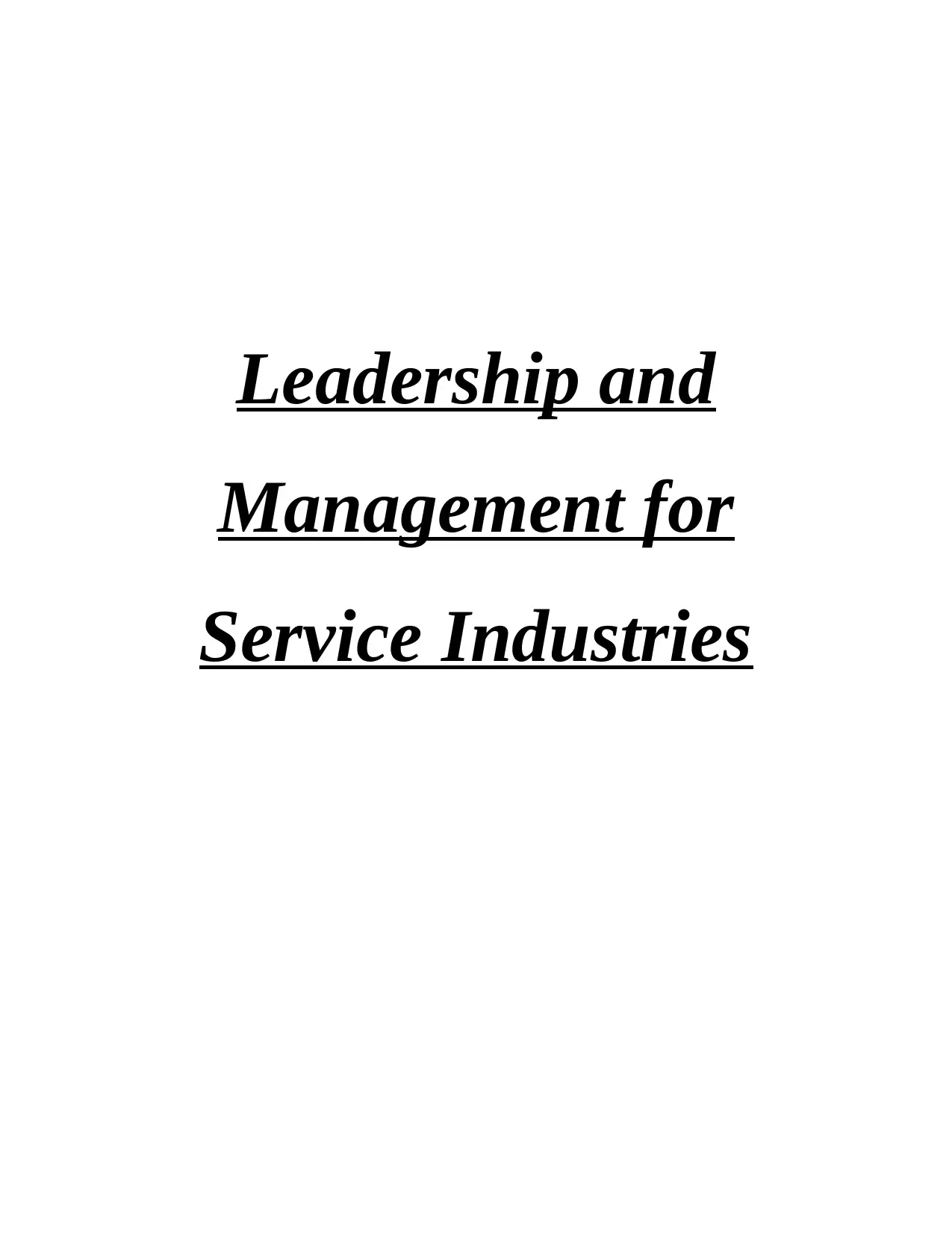
Leadership and
Management for
Service Industries
Management for
Service Industries
Paraphrase This Document
Need a fresh take? Get an instant paraphrase of this document with our AI Paraphraser
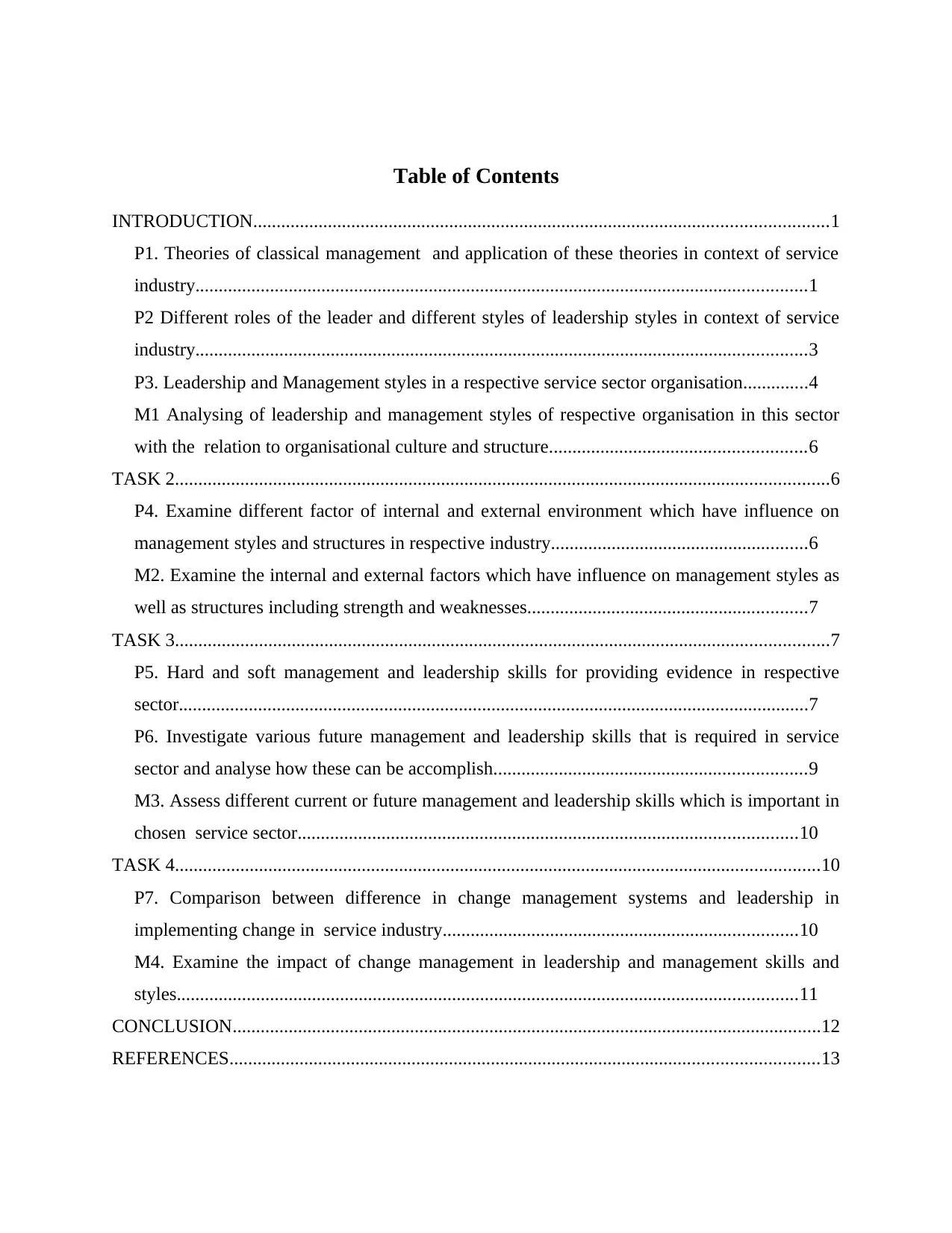
Table of Contents
INTRODUCTION...........................................................................................................................1
P1. Theories of classical management and application of these theories in context of service
industry...................................................................................................................................1
P2 Different roles of the leader and different styles of leadership styles in context of service
industry...................................................................................................................................3
P3. Leadership and Management styles in a respective service sector organisation..............4
M1 Analysing of leadership and management styles of respective organisation in this sector
with the relation to organisational culture and structure.......................................................6
TASK 2............................................................................................................................................6
P4. Examine different factor of internal and external environment which have influence on
management styles and structures in respective industry.......................................................6
M2. Examine the internal and external factors which have influence on management styles as
well as structures including strength and weaknesses............................................................7
TASK 3............................................................................................................................................7
P5. Hard and soft management and leadership skills for providing evidence in respective
sector.......................................................................................................................................7
P6. Investigate various future management and leadership skills that is required in service
sector and analyse how these can be accomplish...................................................................9
M3. Assess different current or future management and leadership skills which is important in
chosen service sector...........................................................................................................10
TASK 4..........................................................................................................................................10
P7. Comparison between difference in change management systems and leadership in
implementing change in service industry............................................................................10
M4. Examine the impact of change management in leadership and management skills and
styles.....................................................................................................................................11
CONCLUSION..............................................................................................................................12
REFERENCES..............................................................................................................................13
INTRODUCTION...........................................................................................................................1
P1. Theories of classical management and application of these theories in context of service
industry...................................................................................................................................1
P2 Different roles of the leader and different styles of leadership styles in context of service
industry...................................................................................................................................3
P3. Leadership and Management styles in a respective service sector organisation..............4
M1 Analysing of leadership and management styles of respective organisation in this sector
with the relation to organisational culture and structure.......................................................6
TASK 2............................................................................................................................................6
P4. Examine different factor of internal and external environment which have influence on
management styles and structures in respective industry.......................................................6
M2. Examine the internal and external factors which have influence on management styles as
well as structures including strength and weaknesses............................................................7
TASK 3............................................................................................................................................7
P5. Hard and soft management and leadership skills for providing evidence in respective
sector.......................................................................................................................................7
P6. Investigate various future management and leadership skills that is required in service
sector and analyse how these can be accomplish...................................................................9
M3. Assess different current or future management and leadership skills which is important in
chosen service sector...........................................................................................................10
TASK 4..........................................................................................................................................10
P7. Comparison between difference in change management systems and leadership in
implementing change in service industry............................................................................10
M4. Examine the impact of change management in leadership and management skills and
styles.....................................................................................................................................11
CONCLUSION..............................................................................................................................12
REFERENCES..............................................................................................................................13
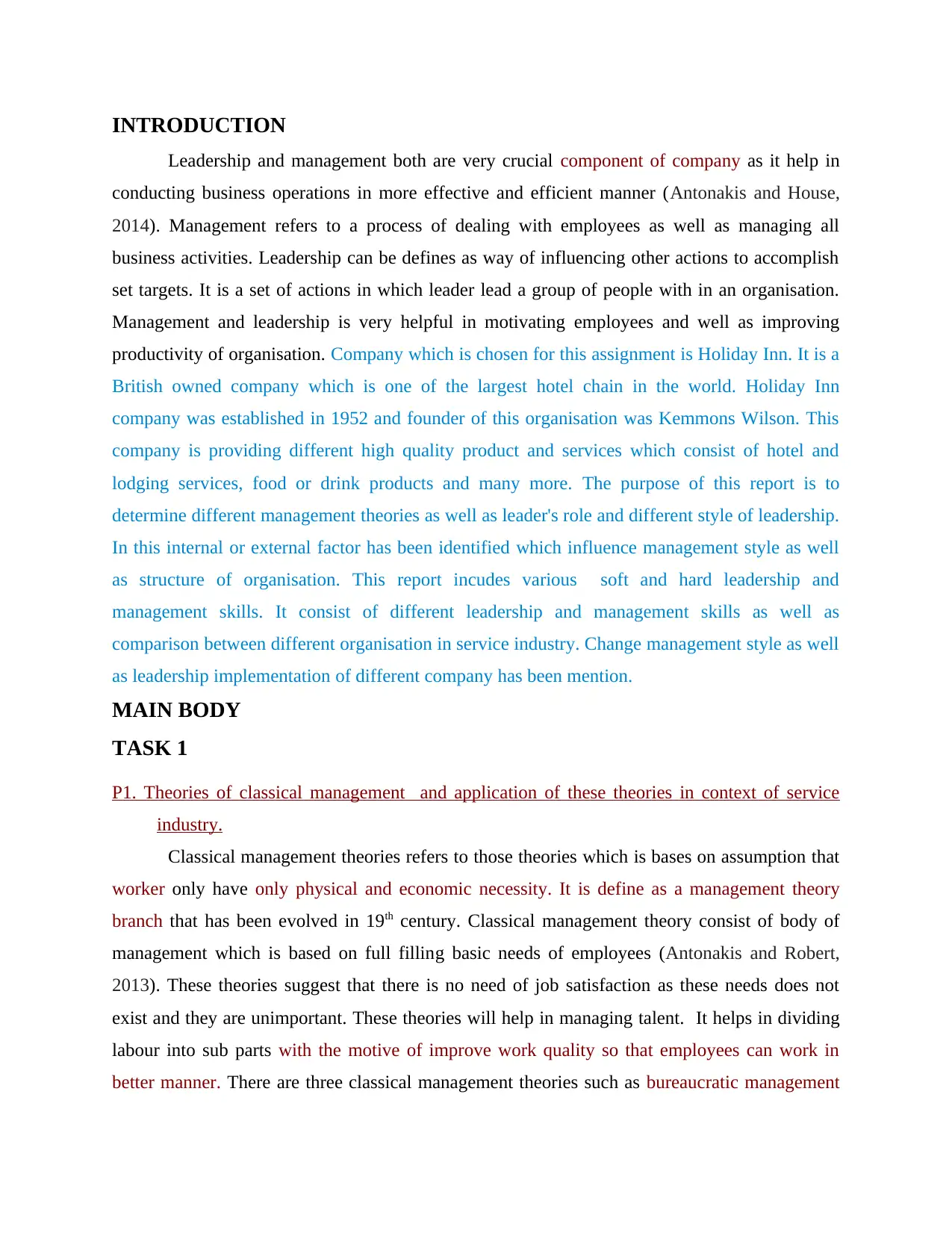
INTRODUCTION
Leadership and management both are very crucial component of company as it help in
conducting business operations in more effective and efficient manner (Antonakis and House,
2014). Management refers to a process of dealing with employees as well as managing all
business activities. Leadership can be defines as way of influencing other actions to accomplish
set targets. It is a set of actions in which leader lead a group of people with in an organisation.
Management and leadership is very helpful in motivating employees and well as improving
productivity of organisation. Company which is chosen for this assignment is Holiday Inn. It is a
British owned company which is one of the largest hotel chain in the world. Holiday Inn
company was established in 1952 and founder of this organisation was Kemmons Wilson. This
company is providing different high quality product and services which consist of hotel and
lodging services, food or drink products and many more. The purpose of this report is to
determine different management theories as well as leader's role and different style of leadership.
In this internal or external factor has been identified which influence management style as well
as structure of organisation. This report incudes various soft and hard leadership and
management skills. It consist of different leadership and management skills as well as
comparison between different organisation in service industry. Change management style as well
as leadership implementation of different company has been mention.
MAIN BODY
TASK 1
P1. Theories of classical management and application of these theories in context of service
industry.
Classical management theories refers to those theories which is bases on assumption that
worker only have only physical and economic necessity. It is define as a management theory
branch that has been evolved in 19th century. Classical management theory consist of body of
management which is based on full filling basic needs of employees (Antonakis and Robert,
2013). These theories suggest that there is no need of job satisfaction as these needs does not
exist and they are unimportant. These theories will help in managing talent. It helps in dividing
labour into sub parts with the motive of improve work quality so that employees can work in
better manner. There are three classical management theories such as bureaucratic management
Leadership and management both are very crucial component of company as it help in
conducting business operations in more effective and efficient manner (Antonakis and House,
2014). Management refers to a process of dealing with employees as well as managing all
business activities. Leadership can be defines as way of influencing other actions to accomplish
set targets. It is a set of actions in which leader lead a group of people with in an organisation.
Management and leadership is very helpful in motivating employees and well as improving
productivity of organisation. Company which is chosen for this assignment is Holiday Inn. It is a
British owned company which is one of the largest hotel chain in the world. Holiday Inn
company was established in 1952 and founder of this organisation was Kemmons Wilson. This
company is providing different high quality product and services which consist of hotel and
lodging services, food or drink products and many more. The purpose of this report is to
determine different management theories as well as leader's role and different style of leadership.
In this internal or external factor has been identified which influence management style as well
as structure of organisation. This report incudes various soft and hard leadership and
management skills. It consist of different leadership and management skills as well as
comparison between different organisation in service industry. Change management style as well
as leadership implementation of different company has been mention.
MAIN BODY
TASK 1
P1. Theories of classical management and application of these theories in context of service
industry.
Classical management theories refers to those theories which is bases on assumption that
worker only have only physical and economic necessity. It is define as a management theory
branch that has been evolved in 19th century. Classical management theory consist of body of
management which is based on full filling basic needs of employees (Antonakis and Robert,
2013). These theories suggest that there is no need of job satisfaction as these needs does not
exist and they are unimportant. These theories will help in managing talent. It helps in dividing
labour into sub parts with the motive of improve work quality so that employees can work in
better manner. There are three classical management theories such as bureaucratic management
⊘ This is a preview!⊘
Do you want full access?
Subscribe today to unlock all pages.

Trusted by 1+ million students worldwide
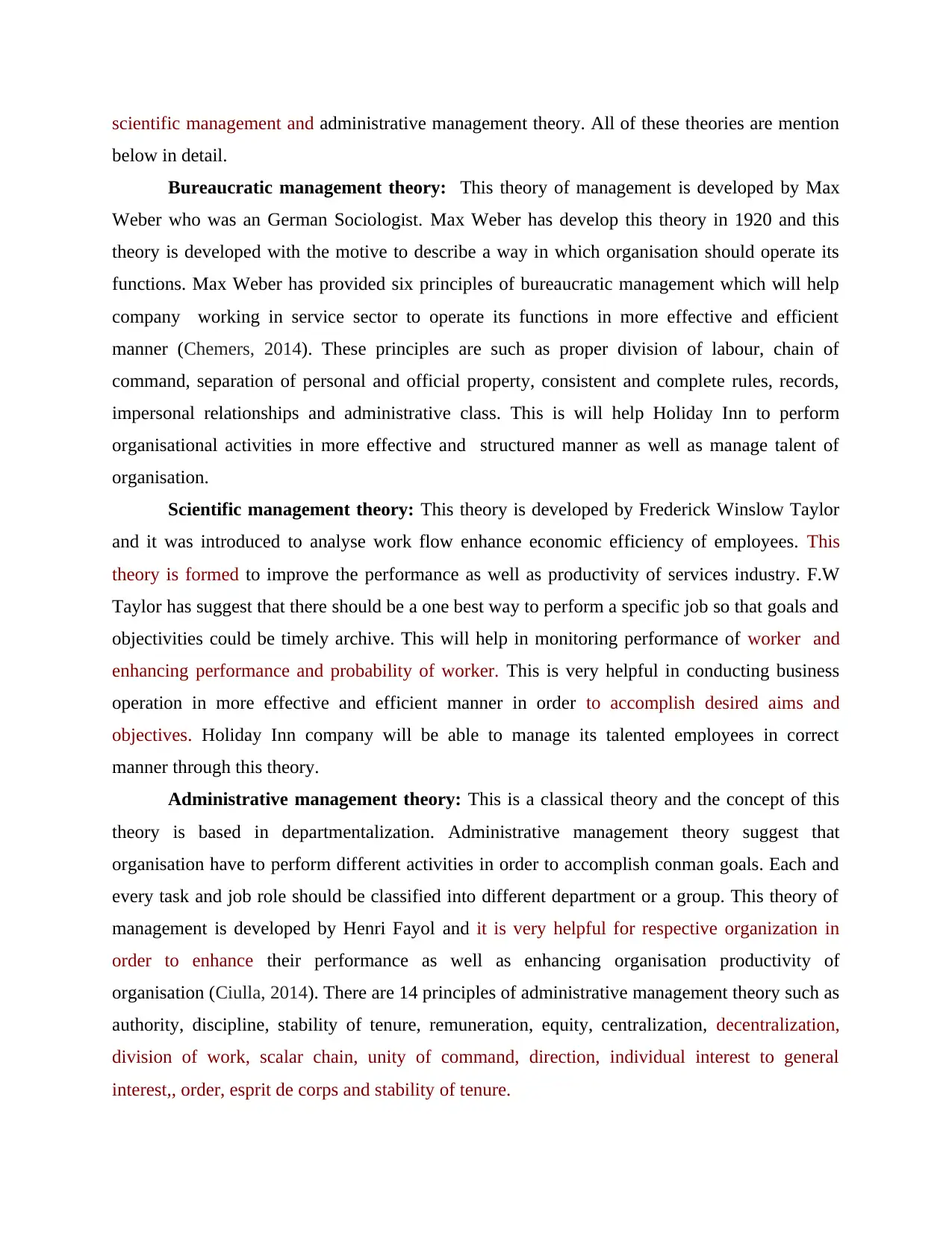
scientific management and administrative management theory. All of these theories are mention
below in detail.
Bureaucratic management theory: This theory of management is developed by Max
Weber who was an German Sociologist. Max Weber has develop this theory in 1920 and this
theory is developed with the motive to describe a way in which organisation should operate its
functions. Max Weber has provided six principles of bureaucratic management which will help
company working in service sector to operate its functions in more effective and efficient
manner (Chemers, 2014). These principles are such as proper division of labour, chain of
command, separation of personal and official property, consistent and complete rules, records,
impersonal relationships and administrative class. This is will help Holiday Inn to perform
organisational activities in more effective and structured manner as well as manage talent of
organisation.
Scientific management theory: This theory is developed by Frederick Winslow Taylor
and it was introduced to analyse work flow enhance economic efficiency of employees. This
theory is formed to improve the performance as well as productivity of services industry. F.W
Taylor has suggest that there should be a one best way to perform a specific job so that goals and
objectivities could be timely archive. This will help in monitoring performance of worker and
enhancing performance and probability of worker. This is very helpful in conducting business
operation in more effective and efficient manner in order to accomplish desired aims and
objectives. Holiday Inn company will be able to manage its talented employees in correct
manner through this theory.
Administrative management theory: This is a classical theory and the concept of this
theory is based in departmentalization. Administrative management theory suggest that
organisation have to perform different activities in order to accomplish conman goals. Each and
every task and job role should be classified into different department or a group. This theory of
management is developed by Henri Fayol and it is very helpful for respective organization in
order to enhance their performance as well as enhancing organisation productivity of
organisation (Ciulla, 2014). There are 14 principles of administrative management theory such as
authority, discipline, stability of tenure, remuneration, equity, centralization, decentralization,
division of work, scalar chain, unity of command, direction, individual interest to general
interest,, order, esprit de corps and stability of tenure.
below in detail.
Bureaucratic management theory: This theory of management is developed by Max
Weber who was an German Sociologist. Max Weber has develop this theory in 1920 and this
theory is developed with the motive to describe a way in which organisation should operate its
functions. Max Weber has provided six principles of bureaucratic management which will help
company working in service sector to operate its functions in more effective and efficient
manner (Chemers, 2014). These principles are such as proper division of labour, chain of
command, separation of personal and official property, consistent and complete rules, records,
impersonal relationships and administrative class. This is will help Holiday Inn to perform
organisational activities in more effective and structured manner as well as manage talent of
organisation.
Scientific management theory: This theory is developed by Frederick Winslow Taylor
and it was introduced to analyse work flow enhance economic efficiency of employees. This
theory is formed to improve the performance as well as productivity of services industry. F.W
Taylor has suggest that there should be a one best way to perform a specific job so that goals and
objectivities could be timely archive. This will help in monitoring performance of worker and
enhancing performance and probability of worker. This is very helpful in conducting business
operation in more effective and efficient manner in order to accomplish desired aims and
objectives. Holiday Inn company will be able to manage its talented employees in correct
manner through this theory.
Administrative management theory: This is a classical theory and the concept of this
theory is based in departmentalization. Administrative management theory suggest that
organisation have to perform different activities in order to accomplish conman goals. Each and
every task and job role should be classified into different department or a group. This theory of
management is developed by Henri Fayol and it is very helpful for respective organization in
order to enhance their performance as well as enhancing organisation productivity of
organisation (Ciulla, 2014). There are 14 principles of administrative management theory such as
authority, discipline, stability of tenure, remuneration, equity, centralization, decentralization,
division of work, scalar chain, unity of command, direction, individual interest to general
interest,, order, esprit de corps and stability of tenure.
Paraphrase This Document
Need a fresh take? Get an instant paraphrase of this document with our AI Paraphraser
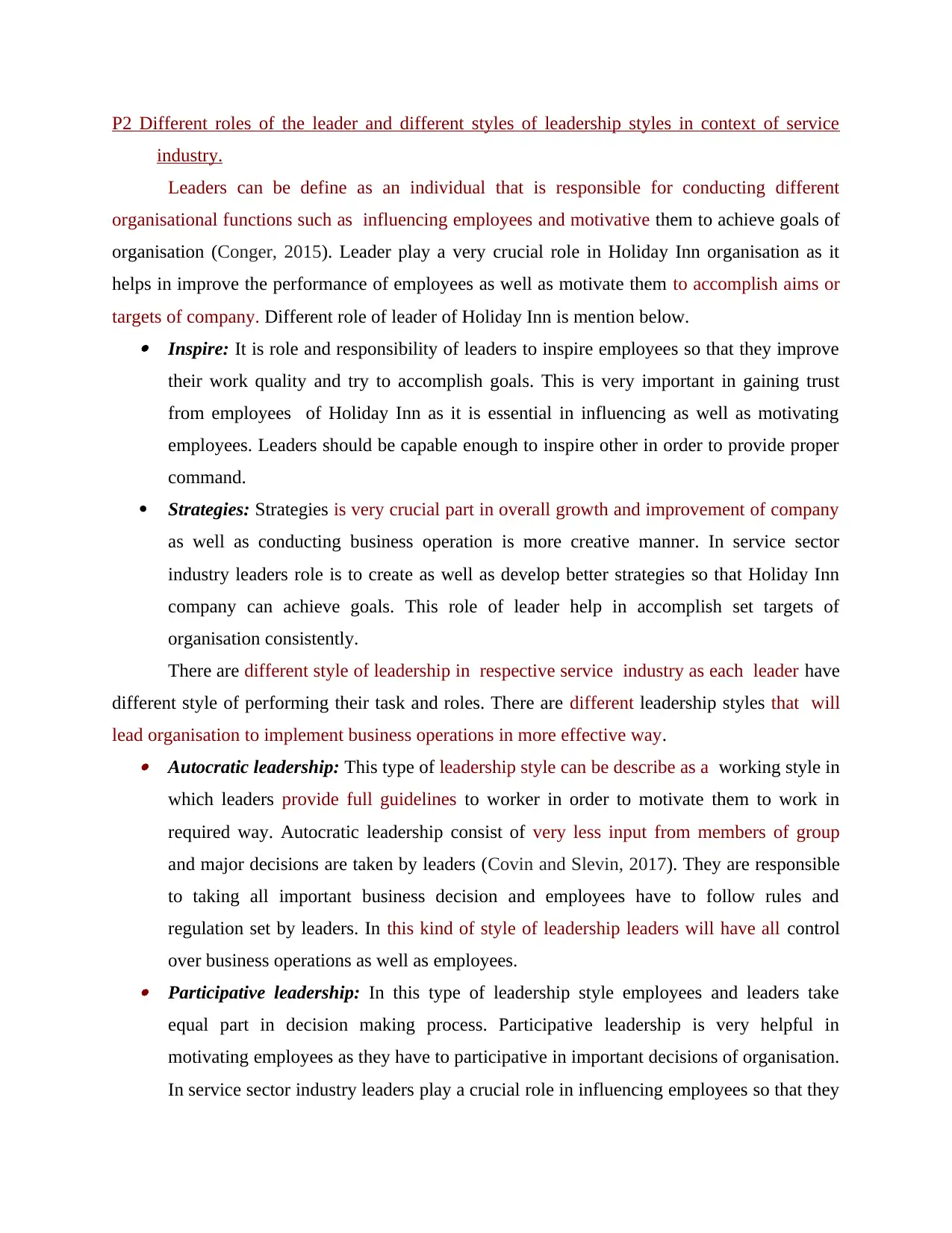
P2 Different roles of the leader and different styles of leadership styles in context of service
industry.
Leaders can be define as an individual that is responsible for conducting different
organisational functions such as influencing employees and motivative them to achieve goals of
organisation (Conger, 2015). Leader play a very crucial role in Holiday Inn organisation as it
helps in improve the performance of employees as well as motivate them to accomplish aims or
targets of company. Different role of leader of Holiday Inn is mention below. Inspire: It is role and responsibility of leaders to inspire employees so that they improve
their work quality and try to accomplish goals. This is very important in gaining trust
from employees of Holiday Inn as it is essential in influencing as well as motivating
employees. Leaders should be capable enough to inspire other in order to provide proper
command.
Strategies: Strategies is very crucial part in overall growth and improvement of company
as well as conducting business operation is more creative manner. In service sector
industry leaders role is to create as well as develop better strategies so that Holiday Inn
company can achieve goals. This role of leader help in accomplish set targets of
organisation consistently.
There are different style of leadership in respective service industry as each leader have
different style of performing their task and roles. There are different leadership styles that will
lead organisation to implement business operations in more effective way. Autocratic leadership: This type of leadership style can be describe as a working style in
which leaders provide full guidelines to worker in order to motivate them to work in
required way. Autocratic leadership consist of very less input from members of group
and major decisions are taken by leaders (Covin and Slevin, 2017). They are responsible
to taking all important business decision and employees have to follow rules and
regulation set by leaders. In this kind of style of leadership leaders will have all control
over business operations as well as employees. Participative leadership: In this type of leadership style employees and leaders take
equal part in decision making process. Participative leadership is very helpful in
motivating employees as they have to participative in important decisions of organisation.
In service sector industry leaders play a crucial role in influencing employees so that they
industry.
Leaders can be define as an individual that is responsible for conducting different
organisational functions such as influencing employees and motivative them to achieve goals of
organisation (Conger, 2015). Leader play a very crucial role in Holiday Inn organisation as it
helps in improve the performance of employees as well as motivate them to accomplish aims or
targets of company. Different role of leader of Holiday Inn is mention below. Inspire: It is role and responsibility of leaders to inspire employees so that they improve
their work quality and try to accomplish goals. This is very important in gaining trust
from employees of Holiday Inn as it is essential in influencing as well as motivating
employees. Leaders should be capable enough to inspire other in order to provide proper
command.
Strategies: Strategies is very crucial part in overall growth and improvement of company
as well as conducting business operation is more creative manner. In service sector
industry leaders role is to create as well as develop better strategies so that Holiday Inn
company can achieve goals. This role of leader help in accomplish set targets of
organisation consistently.
There are different style of leadership in respective service industry as each leader have
different style of performing their task and roles. There are different leadership styles that will
lead organisation to implement business operations in more effective way. Autocratic leadership: This type of leadership style can be describe as a working style in
which leaders provide full guidelines to worker in order to motivate them to work in
required way. Autocratic leadership consist of very less input from members of group
and major decisions are taken by leaders (Covin and Slevin, 2017). They are responsible
to taking all important business decision and employees have to follow rules and
regulation set by leaders. In this kind of style of leadership leaders will have all control
over business operations as well as employees. Participative leadership: In this type of leadership style employees and leaders take
equal part in decision making process. Participative leadership is very helpful in
motivating employees as they have to participative in important decisions of organisation.
In service sector industry leaders play a crucial role in influencing employees so that they
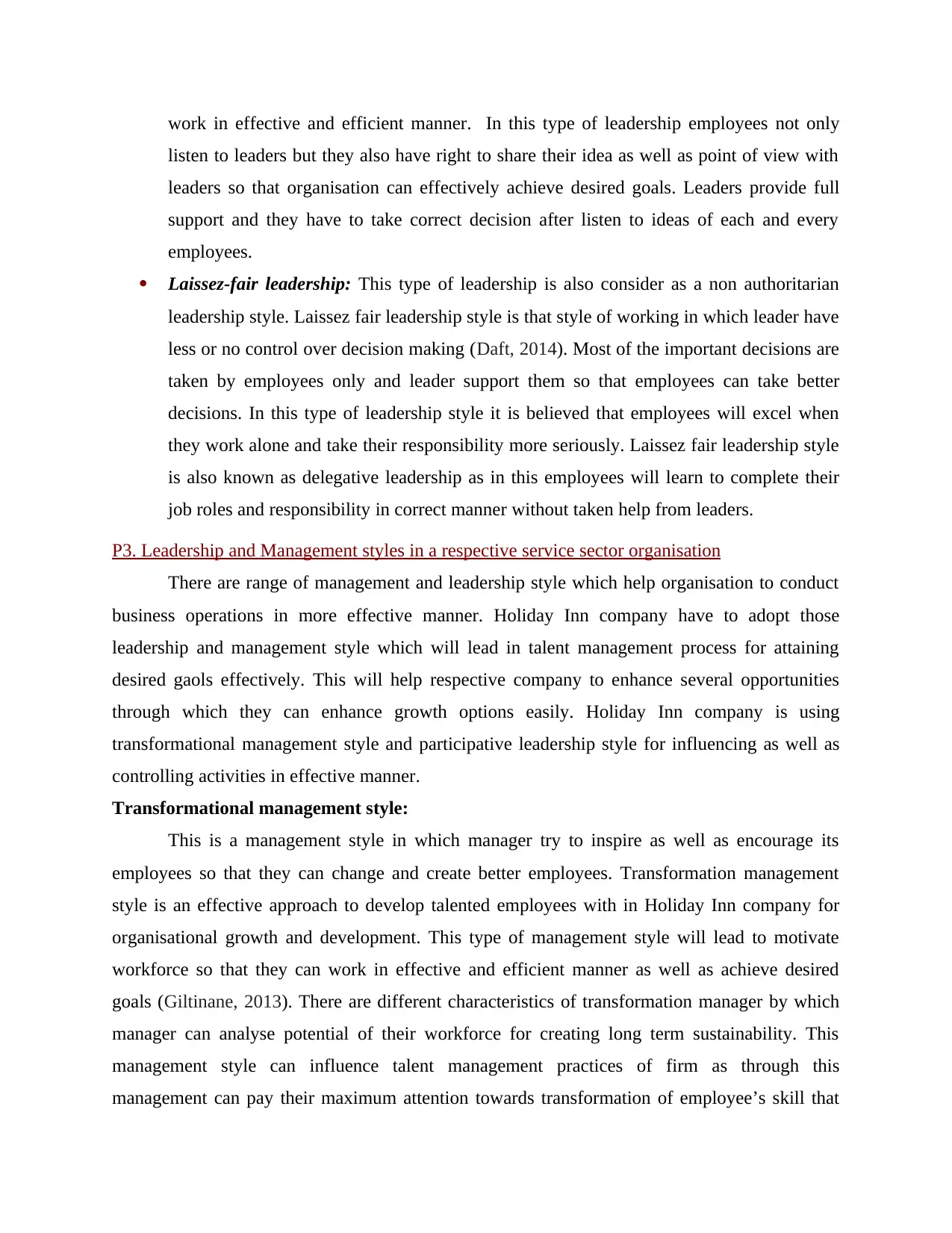
work in effective and efficient manner. In this type of leadership employees not only
listen to leaders but they also have right to share their idea as well as point of view with
leaders so that organisation can effectively achieve desired goals. Leaders provide full
support and they have to take correct decision after listen to ideas of each and every
employees.
Laissez-fair leadership: This type of leadership is also consider as a non authoritarian
leadership style. Laissez fair leadership style is that style of working in which leader have
less or no control over decision making (Daft, 2014). Most of the important decisions are
taken by employees only and leader support them so that employees can take better
decisions. In this type of leadership style it is believed that employees will excel when
they work alone and take their responsibility more seriously. Laissez fair leadership style
is also known as delegative leadership as in this employees will learn to complete their
job roles and responsibility in correct manner without taken help from leaders.
P3. Leadership and Management styles in a respective service sector organisation
There are range of management and leadership style which help organisation to conduct
business operations in more effective manner. Holiday Inn company have to adopt those
leadership and management style which will lead in talent management process for attaining
desired gaols effectively. This will help respective company to enhance several opportunities
through which they can enhance growth options easily. Holiday Inn company is using
transformational management style and participative leadership style for influencing as well as
controlling activities in effective manner.
Transformational management style:
This is a management style in which manager try to inspire as well as encourage its
employees so that they can change and create better employees. Transformation management
style is an effective approach to develop talented employees with in Holiday Inn company for
organisational growth and development. This type of management style will lead to motivate
workforce so that they can work in effective and efficient manner as well as achieve desired
goals (Giltinane, 2013). There are different characteristics of transformation manager by which
manager can analyse potential of their workforce for creating long term sustainability. This
management style can influence talent management practices of firm as through this
management can pay their maximum attention towards transformation of employee’s skill that
listen to leaders but they also have right to share their idea as well as point of view with
leaders so that organisation can effectively achieve desired goals. Leaders provide full
support and they have to take correct decision after listen to ideas of each and every
employees.
Laissez-fair leadership: This type of leadership is also consider as a non authoritarian
leadership style. Laissez fair leadership style is that style of working in which leader have
less or no control over decision making (Daft, 2014). Most of the important decisions are
taken by employees only and leader support them so that employees can take better
decisions. In this type of leadership style it is believed that employees will excel when
they work alone and take their responsibility more seriously. Laissez fair leadership style
is also known as delegative leadership as in this employees will learn to complete their
job roles and responsibility in correct manner without taken help from leaders.
P3. Leadership and Management styles in a respective service sector organisation
There are range of management and leadership style which help organisation to conduct
business operations in more effective manner. Holiday Inn company have to adopt those
leadership and management style which will lead in talent management process for attaining
desired gaols effectively. This will help respective company to enhance several opportunities
through which they can enhance growth options easily. Holiday Inn company is using
transformational management style and participative leadership style for influencing as well as
controlling activities in effective manner.
Transformational management style:
This is a management style in which manager try to inspire as well as encourage its
employees so that they can change and create better employees. Transformation management
style is an effective approach to develop talented employees with in Holiday Inn company for
organisational growth and development. This type of management style will lead to motivate
workforce so that they can work in effective and efficient manner as well as achieve desired
goals (Giltinane, 2013). There are different characteristics of transformation manager by which
manager can analyse potential of their workforce for creating long term sustainability. This
management style can influence talent management practices of firm as through this
management can pay their maximum attention towards transformation of employee’s skill that
⊘ This is a preview!⊘
Do you want full access?
Subscribe today to unlock all pages.

Trusted by 1+ million students worldwide
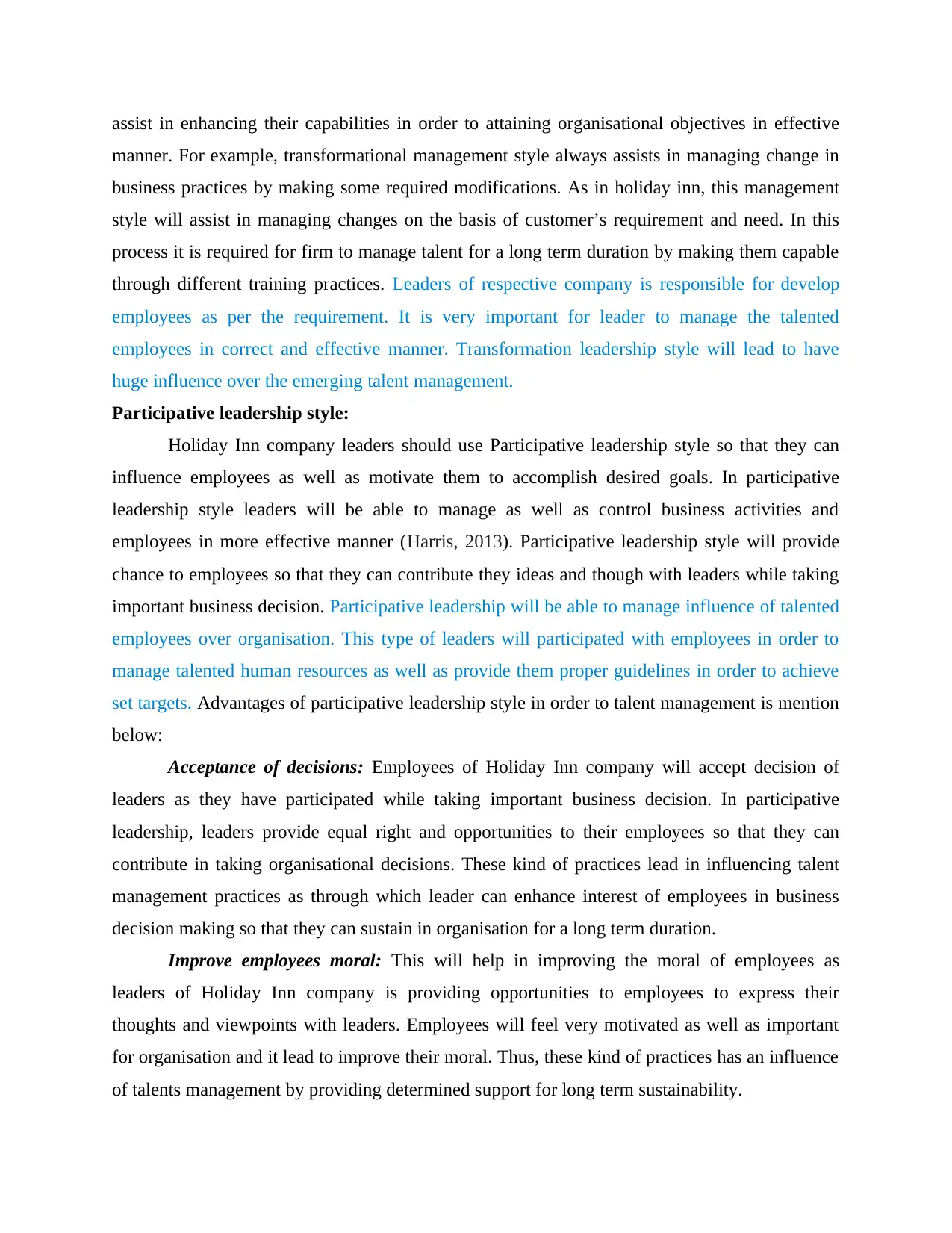
assist in enhancing their capabilities in order to attaining organisational objectives in effective
manner. For example, transformational management style always assists in managing change in
business practices by making some required modifications. As in holiday inn, this management
style will assist in managing changes on the basis of customer’s requirement and need. In this
process it is required for firm to manage talent for a long term duration by making them capable
through different training practices. Leaders of respective company is responsible for develop
employees as per the requirement. It is very important for leader to manage the talented
employees in correct and effective manner. Transformation leadership style will lead to have
huge influence over the emerging talent management.
Participative leadership style:
Holiday Inn company leaders should use Participative leadership style so that they can
influence employees as well as motivate them to accomplish desired goals. In participative
leadership style leaders will be able to manage as well as control business activities and
employees in more effective manner (Harris, 2013). Participative leadership style will provide
chance to employees so that they can contribute they ideas and though with leaders while taking
important business decision. Participative leadership will be able to manage influence of talented
employees over organisation. This type of leaders will participated with employees in order to
manage talented human resources as well as provide them proper guidelines in order to achieve
set targets. Advantages of participative leadership style in order to talent management is mention
below:
Acceptance of decisions: Employees of Holiday Inn company will accept decision of
leaders as they have participated while taking important business decision. In participative
leadership, leaders provide equal right and opportunities to their employees so that they can
contribute in taking organisational decisions. These kind of practices lead in influencing talent
management practices as through which leader can enhance interest of employees in business
decision making so that they can sustain in organisation for a long term duration.
Improve employees moral: This will help in improving the moral of employees as
leaders of Holiday Inn company is providing opportunities to employees to express their
thoughts and viewpoints with leaders. Employees will feel very motivated as well as important
for organisation and it lead to improve their moral. Thus, these kind of practices has an influence
of talents management by providing determined support for long term sustainability.
manner. For example, transformational management style always assists in managing change in
business practices by making some required modifications. As in holiday inn, this management
style will assist in managing changes on the basis of customer’s requirement and need. In this
process it is required for firm to manage talent for a long term duration by making them capable
through different training practices. Leaders of respective company is responsible for develop
employees as per the requirement. It is very important for leader to manage the talented
employees in correct and effective manner. Transformation leadership style will lead to have
huge influence over the emerging talent management.
Participative leadership style:
Holiday Inn company leaders should use Participative leadership style so that they can
influence employees as well as motivate them to accomplish desired goals. In participative
leadership style leaders will be able to manage as well as control business activities and
employees in more effective manner (Harris, 2013). Participative leadership style will provide
chance to employees so that they can contribute they ideas and though with leaders while taking
important business decision. Participative leadership will be able to manage influence of talented
employees over organisation. This type of leaders will participated with employees in order to
manage talented human resources as well as provide them proper guidelines in order to achieve
set targets. Advantages of participative leadership style in order to talent management is mention
below:
Acceptance of decisions: Employees of Holiday Inn company will accept decision of
leaders as they have participated while taking important business decision. In participative
leadership, leaders provide equal right and opportunities to their employees so that they can
contribute in taking organisational decisions. These kind of practices lead in influencing talent
management practices as through which leader can enhance interest of employees in business
decision making so that they can sustain in organisation for a long term duration.
Improve employees moral: This will help in improving the moral of employees as
leaders of Holiday Inn company is providing opportunities to employees to express their
thoughts and viewpoints with leaders. Employees will feel very motivated as well as important
for organisation and it lead to improve their moral. Thus, these kind of practices has an influence
of talents management by providing determined support for long term sustainability.
Paraphrase This Document
Need a fresh take? Get an instant paraphrase of this document with our AI Paraphraser
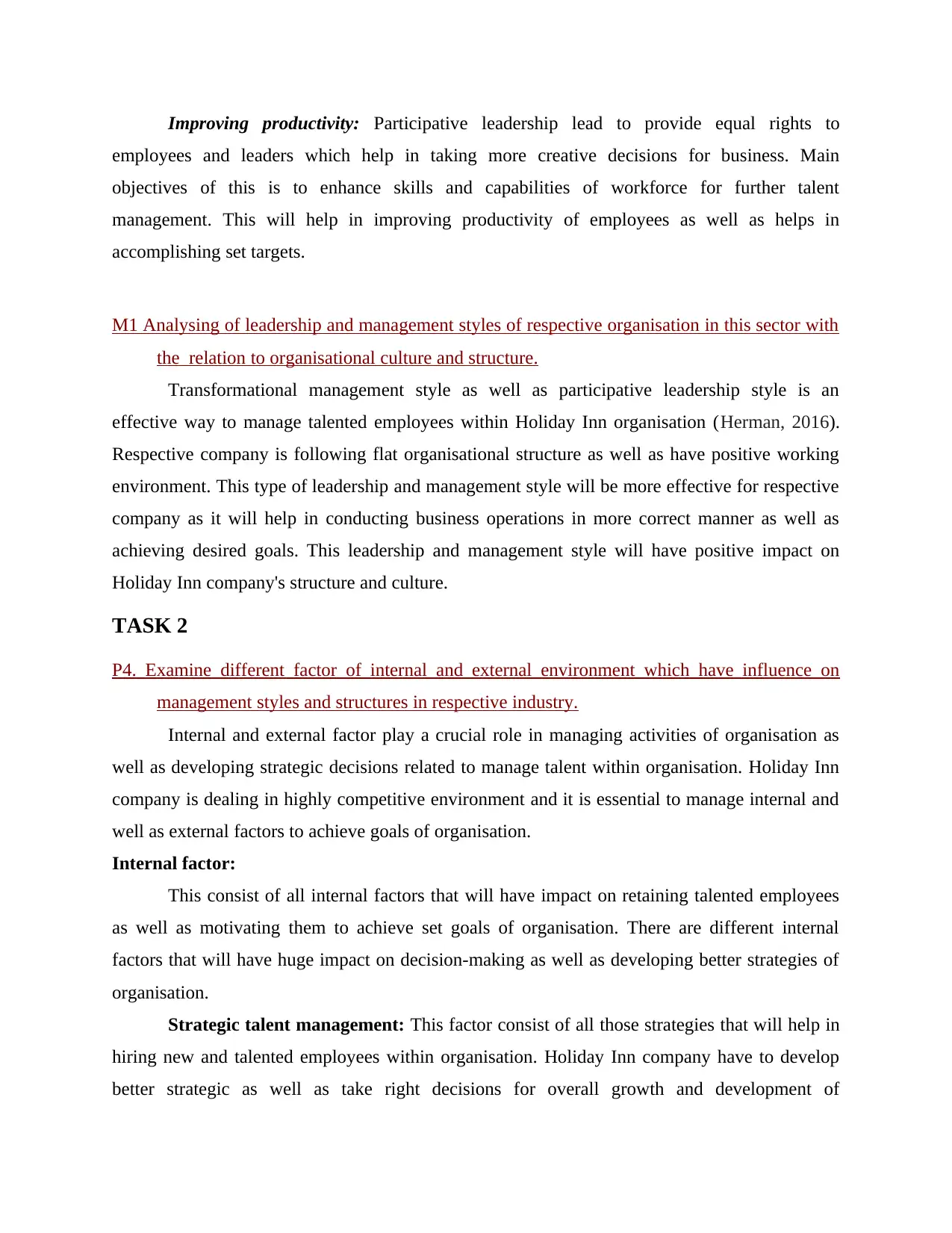
Improving productivity: Participative leadership lead to provide equal rights to
employees and leaders which help in taking more creative decisions for business. Main
objectives of this is to enhance skills and capabilities of workforce for further talent
management. This will help in improving productivity of employees as well as helps in
accomplishing set targets.
M1 Analysing of leadership and management styles of respective organisation in this sector with
the relation to organisational culture and structure.
Transformational management style as well as participative leadership style is an
effective way to manage talented employees within Holiday Inn organisation (Herman, 2016).
Respective company is following flat organisational structure as well as have positive working
environment. This type of leadership and management style will be more effective for respective
company as it will help in conducting business operations in more correct manner as well as
achieving desired goals. This leadership and management style will have positive impact on
Holiday Inn company's structure and culture.
TASK 2
P4. Examine different factor of internal and external environment which have influence on
management styles and structures in respective industry.
Internal and external factor play a crucial role in managing activities of organisation as
well as developing strategic decisions related to manage talent within organisation. Holiday Inn
company is dealing in highly competitive environment and it is essential to manage internal and
well as external factors to achieve goals of organisation.
Internal factor:
This consist of all internal factors that will have impact on retaining talented employees
as well as motivating them to achieve set goals of organisation. There are different internal
factors that will have huge impact on decision-making as well as developing better strategies of
organisation.
Strategic talent management: This factor consist of all those strategies that will help in
hiring new and talented employees within organisation. Holiday Inn company have to develop
better strategic as well as take right decisions for overall growth and development of
employees and leaders which help in taking more creative decisions for business. Main
objectives of this is to enhance skills and capabilities of workforce for further talent
management. This will help in improving productivity of employees as well as helps in
accomplishing set targets.
M1 Analysing of leadership and management styles of respective organisation in this sector with
the relation to organisational culture and structure.
Transformational management style as well as participative leadership style is an
effective way to manage talented employees within Holiday Inn organisation (Herman, 2016).
Respective company is following flat organisational structure as well as have positive working
environment. This type of leadership and management style will be more effective for respective
company as it will help in conducting business operations in more correct manner as well as
achieving desired goals. This leadership and management style will have positive impact on
Holiday Inn company's structure and culture.
TASK 2
P4. Examine different factor of internal and external environment which have influence on
management styles and structures in respective industry.
Internal and external factor play a crucial role in managing activities of organisation as
well as developing strategic decisions related to manage talent within organisation. Holiday Inn
company is dealing in highly competitive environment and it is essential to manage internal and
well as external factors to achieve goals of organisation.
Internal factor:
This consist of all internal factors that will have impact on retaining talented employees
as well as motivating them to achieve set goals of organisation. There are different internal
factors that will have huge impact on decision-making as well as developing better strategies of
organisation.
Strategic talent management: This factor consist of all those strategies that will help in
hiring new and talented employees within organisation. Holiday Inn company have to develop
better strategic as well as take right decisions for overall growth and development of
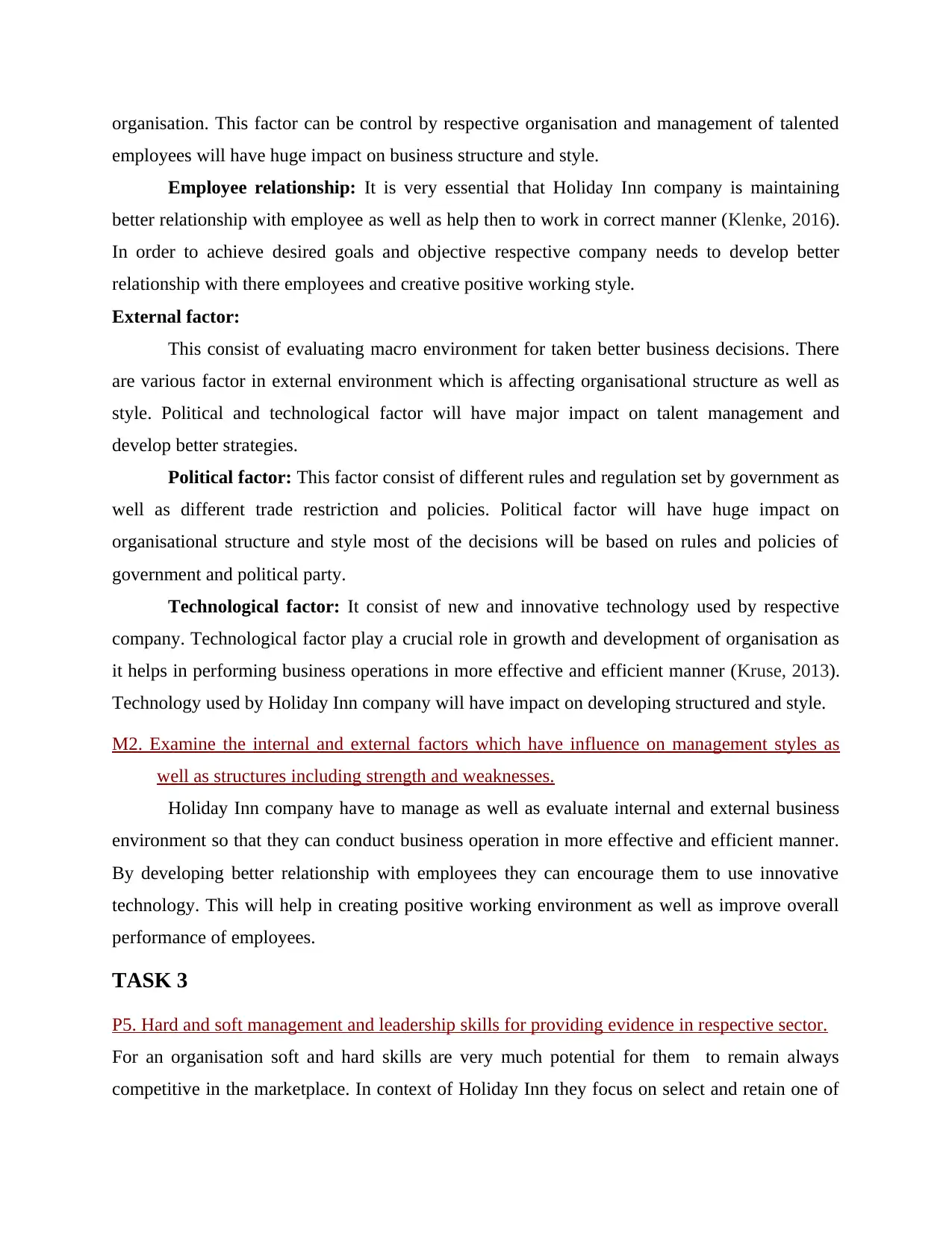
organisation. This factor can be control by respective organisation and management of talented
employees will have huge impact on business structure and style.
Employee relationship: It is very essential that Holiday Inn company is maintaining
better relationship with employee as well as help then to work in correct manner (Klenke, 2016).
In order to achieve desired goals and objective respective company needs to develop better
relationship with there employees and creative positive working style.
External factor:
This consist of evaluating macro environment for taken better business decisions. There
are various factor in external environment which is affecting organisational structure as well as
style. Political and technological factor will have major impact on talent management and
develop better strategies.
Political factor: This factor consist of different rules and regulation set by government as
well as different trade restriction and policies. Political factor will have huge impact on
organisational structure and style most of the decisions will be based on rules and policies of
government and political party.
Technological factor: It consist of new and innovative technology used by respective
company. Technological factor play a crucial role in growth and development of organisation as
it helps in performing business operations in more effective and efficient manner (Kruse, 2013).
Technology used by Holiday Inn company will have impact on developing structured and style.
M2. Examine the internal and external factors which have influence on management styles as
well as structures including strength and weaknesses.
Holiday Inn company have to manage as well as evaluate internal and external business
environment so that they can conduct business operation in more effective and efficient manner.
By developing better relationship with employees they can encourage them to use innovative
technology. This will help in creating positive working environment as well as improve overall
performance of employees.
TASK 3
P5. Hard and soft management and leadership skills for providing evidence in respective sector.
For an organisation soft and hard skills are very much potential for them to remain always
competitive in the marketplace. In context of Holiday Inn they focus on select and retain one of
employees will have huge impact on business structure and style.
Employee relationship: It is very essential that Holiday Inn company is maintaining
better relationship with employee as well as help then to work in correct manner (Klenke, 2016).
In order to achieve desired goals and objective respective company needs to develop better
relationship with there employees and creative positive working style.
External factor:
This consist of evaluating macro environment for taken better business decisions. There
are various factor in external environment which is affecting organisational structure as well as
style. Political and technological factor will have major impact on talent management and
develop better strategies.
Political factor: This factor consist of different rules and regulation set by government as
well as different trade restriction and policies. Political factor will have huge impact on
organisational structure and style most of the decisions will be based on rules and policies of
government and political party.
Technological factor: It consist of new and innovative technology used by respective
company. Technological factor play a crucial role in growth and development of organisation as
it helps in performing business operations in more effective and efficient manner (Kruse, 2013).
Technology used by Holiday Inn company will have impact on developing structured and style.
M2. Examine the internal and external factors which have influence on management styles as
well as structures including strength and weaknesses.
Holiday Inn company have to manage as well as evaluate internal and external business
environment so that they can conduct business operation in more effective and efficient manner.
By developing better relationship with employees they can encourage them to use innovative
technology. This will help in creating positive working environment as well as improve overall
performance of employees.
TASK 3
P5. Hard and soft management and leadership skills for providing evidence in respective sector.
For an organisation soft and hard skills are very much potential for them to remain always
competitive in the marketplace. In context of Holiday Inn they focus on select and retain one of
⊘ This is a preview!⊘
Do you want full access?
Subscribe today to unlock all pages.

Trusted by 1+ million students worldwide
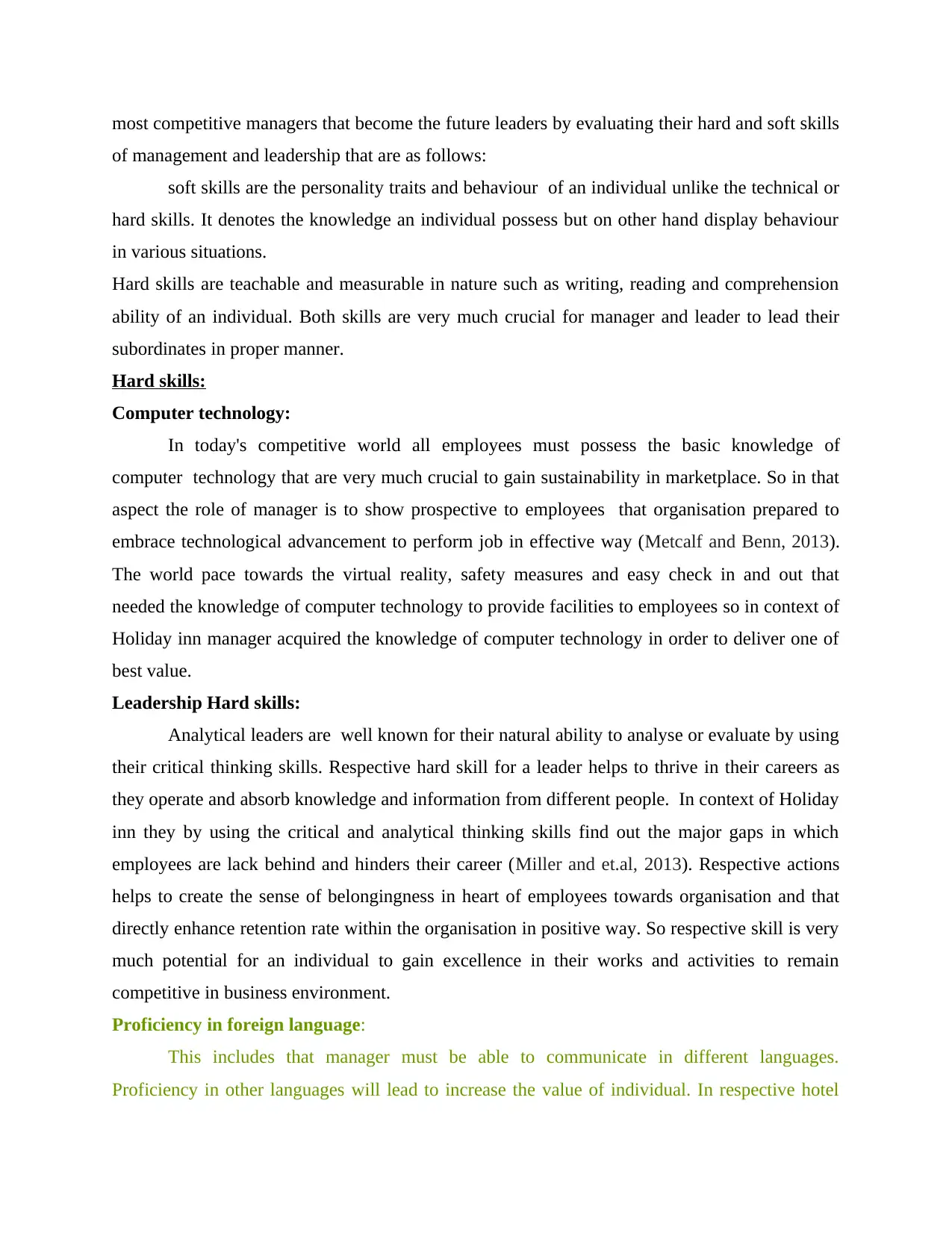
most competitive managers that become the future leaders by evaluating their hard and soft skills
of management and leadership that are as follows:
soft skills are the personality traits and behaviour of an individual unlike the technical or
hard skills. It denotes the knowledge an individual possess but on other hand display behaviour
in various situations.
Hard skills are teachable and measurable in nature such as writing, reading and comprehension
ability of an individual. Both skills are very much crucial for manager and leader to lead their
subordinates in proper manner.
Hard skills:
Computer technology:
In today's competitive world all employees must possess the basic knowledge of
computer technology that are very much crucial to gain sustainability in marketplace. So in that
aspect the role of manager is to show prospective to employees that organisation prepared to
embrace technological advancement to perform job in effective way (Metcalf and Benn, 2013).
The world pace towards the virtual reality, safety measures and easy check in and out that
needed the knowledge of computer technology to provide facilities to employees so in context of
Holiday inn manager acquired the knowledge of computer technology in order to deliver one of
best value.
Leadership Hard skills:
Analytical leaders are well known for their natural ability to analyse or evaluate by using
their critical thinking skills. Respective hard skill for a leader helps to thrive in their careers as
they operate and absorb knowledge and information from different people. In context of Holiday
inn they by using the critical and analytical thinking skills find out the major gaps in which
employees are lack behind and hinders their career (Miller and et.al, 2013). Respective actions
helps to create the sense of belongingness in heart of employees towards organisation and that
directly enhance retention rate within the organisation in positive way. So respective skill is very
much potential for an individual to gain excellence in their works and activities to remain
competitive in business environment.
Proficiency in foreign language:
This includes that manager must be able to communicate in different languages.
Proficiency in other languages will lead to increase the value of individual. In respective hotel
of management and leadership that are as follows:
soft skills are the personality traits and behaviour of an individual unlike the technical or
hard skills. It denotes the knowledge an individual possess but on other hand display behaviour
in various situations.
Hard skills are teachable and measurable in nature such as writing, reading and comprehension
ability of an individual. Both skills are very much crucial for manager and leader to lead their
subordinates in proper manner.
Hard skills:
Computer technology:
In today's competitive world all employees must possess the basic knowledge of
computer technology that are very much crucial to gain sustainability in marketplace. So in that
aspect the role of manager is to show prospective to employees that organisation prepared to
embrace technological advancement to perform job in effective way (Metcalf and Benn, 2013).
The world pace towards the virtual reality, safety measures and easy check in and out that
needed the knowledge of computer technology to provide facilities to employees so in context of
Holiday inn manager acquired the knowledge of computer technology in order to deliver one of
best value.
Leadership Hard skills:
Analytical leaders are well known for their natural ability to analyse or evaluate by using
their critical thinking skills. Respective hard skill for a leader helps to thrive in their careers as
they operate and absorb knowledge and information from different people. In context of Holiday
inn they by using the critical and analytical thinking skills find out the major gaps in which
employees are lack behind and hinders their career (Miller and et.al, 2013). Respective actions
helps to create the sense of belongingness in heart of employees towards organisation and that
directly enhance retention rate within the organisation in positive way. So respective skill is very
much potential for an individual to gain excellence in their works and activities to remain
competitive in business environment.
Proficiency in foreign language:
This includes that manager must be able to communicate in different languages.
Proficiency in other languages will lead to increase the value of individual. In respective hotel
Paraphrase This Document
Need a fresh take? Get an instant paraphrase of this document with our AI Paraphraser
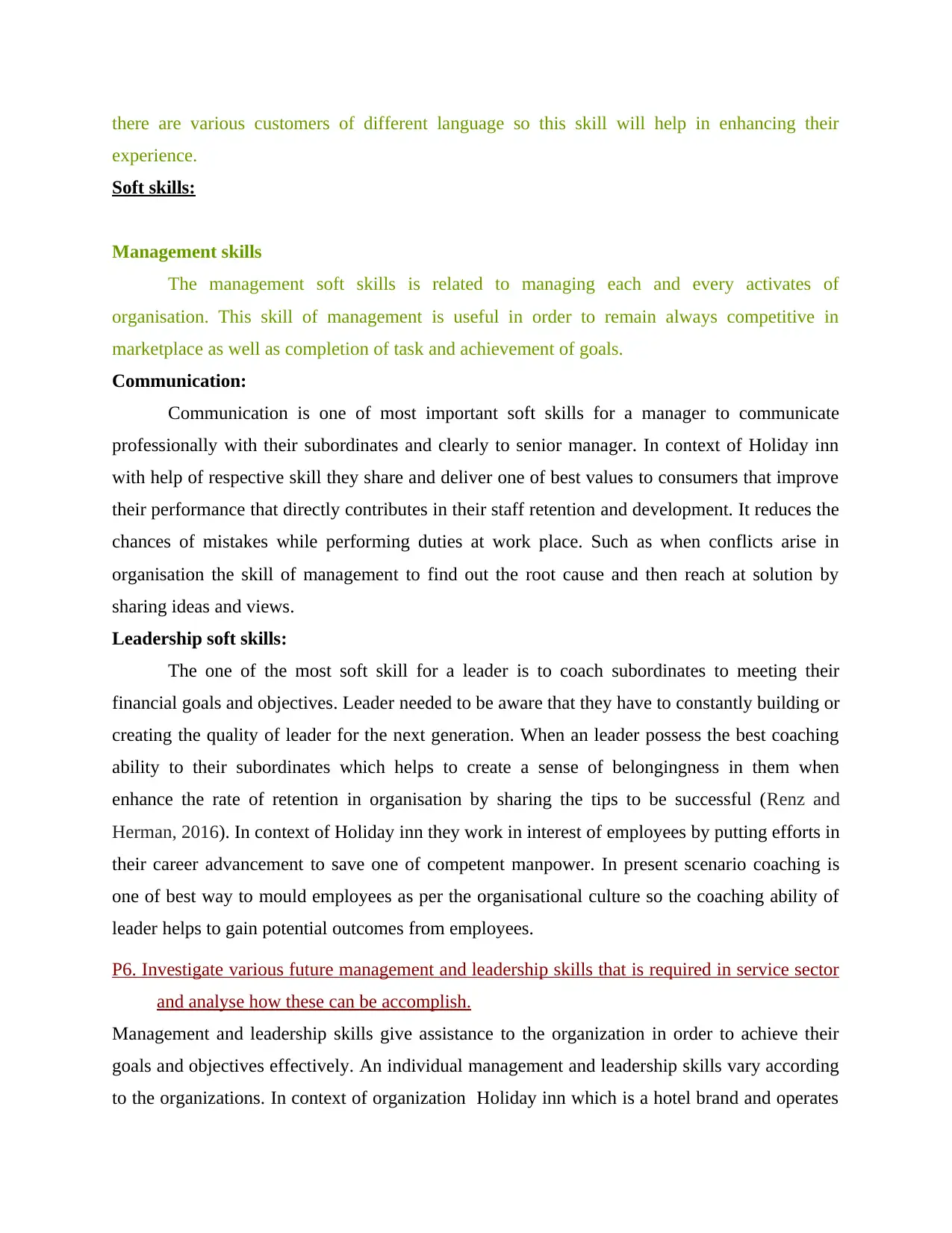
there are various customers of different language so this skill will help in enhancing their
experience.
Soft skills:
Management skills
The management soft skills is related to managing each and every activates of
organisation. This skill of management is useful in order to remain always competitive in
marketplace as well as completion of task and achievement of goals.
Communication:
Communication is one of most important soft skills for a manager to communicate
professionally with their subordinates and clearly to senior manager. In context of Holiday inn
with help of respective skill they share and deliver one of best values to consumers that improve
their performance that directly contributes in their staff retention and development. It reduces the
chances of mistakes while performing duties at work place. Such as when conflicts arise in
organisation the skill of management to find out the root cause and then reach at solution by
sharing ideas and views.
Leadership soft skills:
The one of the most soft skill for a leader is to coach subordinates to meeting their
financial goals and objectives. Leader needed to be aware that they have to constantly building or
creating the quality of leader for the next generation. When an leader possess the best coaching
ability to their subordinates which helps to create a sense of belongingness in them when
enhance the rate of retention in organisation by sharing the tips to be successful (Renz and
Herman, 2016). In context of Holiday inn they work in interest of employees by putting efforts in
their career advancement to save one of competent manpower. In present scenario coaching is
one of best way to mould employees as per the organisational culture so the coaching ability of
leader helps to gain potential outcomes from employees.
P6. Investigate various future management and leadership skills that is required in service sector
and analyse how these can be accomplish.
Management and leadership skills give assistance to the organization in order to achieve their
goals and objectives effectively. An individual management and leadership skills vary according
to the organizations. In context of organization Holiday inn which is a hotel brand and operates
experience.
Soft skills:
Management skills
The management soft skills is related to managing each and every activates of
organisation. This skill of management is useful in order to remain always competitive in
marketplace as well as completion of task and achievement of goals.
Communication:
Communication is one of most important soft skills for a manager to communicate
professionally with their subordinates and clearly to senior manager. In context of Holiday inn
with help of respective skill they share and deliver one of best values to consumers that improve
their performance that directly contributes in their staff retention and development. It reduces the
chances of mistakes while performing duties at work place. Such as when conflicts arise in
organisation the skill of management to find out the root cause and then reach at solution by
sharing ideas and views.
Leadership soft skills:
The one of the most soft skill for a leader is to coach subordinates to meeting their
financial goals and objectives. Leader needed to be aware that they have to constantly building or
creating the quality of leader for the next generation. When an leader possess the best coaching
ability to their subordinates which helps to create a sense of belongingness in them when
enhance the rate of retention in organisation by sharing the tips to be successful (Renz and
Herman, 2016). In context of Holiday inn they work in interest of employees by putting efforts in
their career advancement to save one of competent manpower. In present scenario coaching is
one of best way to mould employees as per the organisational culture so the coaching ability of
leader helps to gain potential outcomes from employees.
P6. Investigate various future management and leadership skills that is required in service sector
and analyse how these can be accomplish.
Management and leadership skills give assistance to the organization in order to achieve their
goals and objectives effectively. An individual management and leadership skills vary according
to the organizations. In context of organization Holiday inn which is a hotel brand and operates
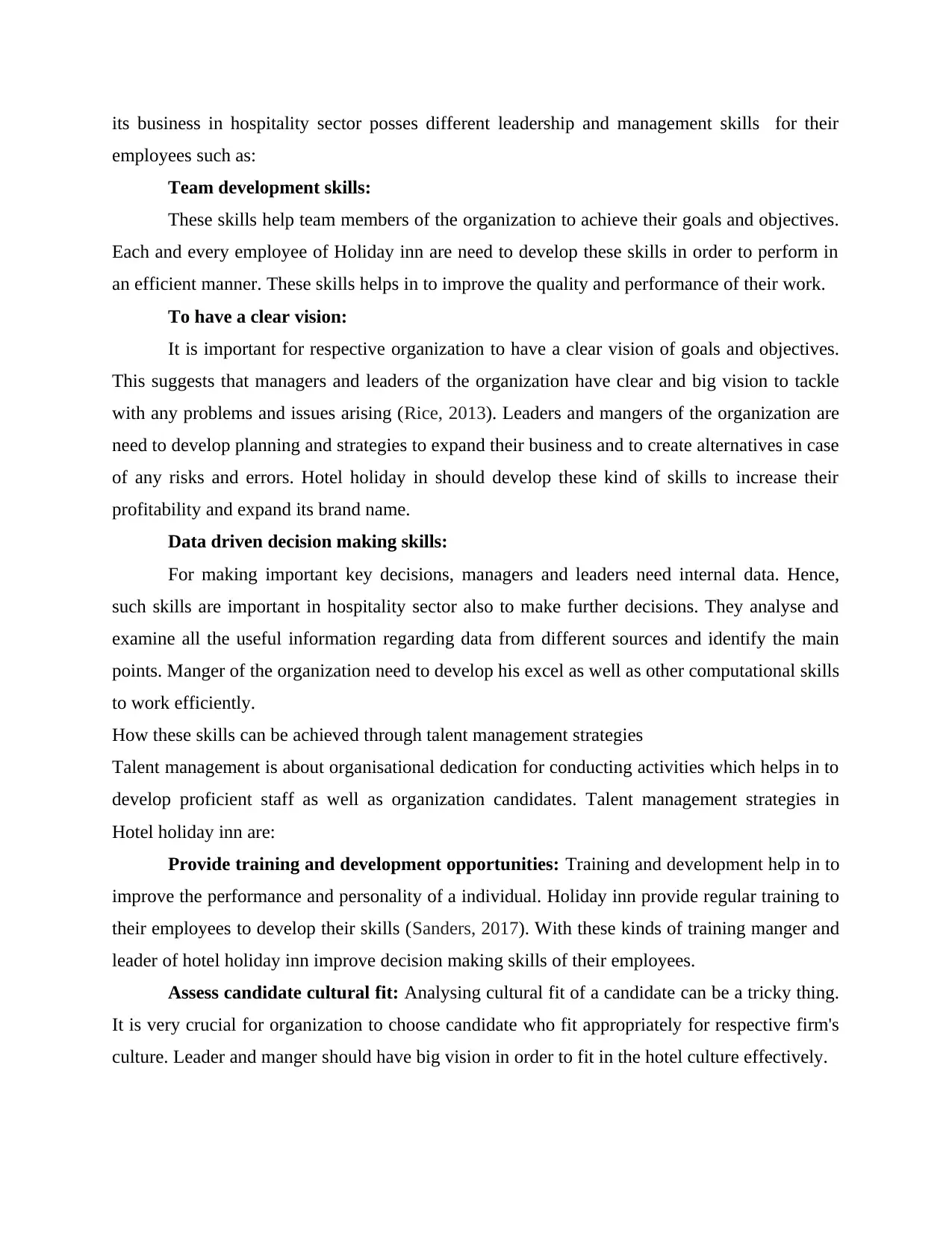
its business in hospitality sector posses different leadership and management skills for their
employees such as:
Team development skills:
These skills help team members of the organization to achieve their goals and objectives.
Each and every employee of Holiday inn are need to develop these skills in order to perform in
an efficient manner. These skills helps in to improve the quality and performance of their work.
To have a clear vision:
It is important for respective organization to have a clear vision of goals and objectives.
This suggests that managers and leaders of the organization have clear and big vision to tackle
with any problems and issues arising (Rice, 2013). Leaders and mangers of the organization are
need to develop planning and strategies to expand their business and to create alternatives in case
of any risks and errors. Hotel holiday in should develop these kind of skills to increase their
profitability and expand its brand name.
Data driven decision making skills:
For making important key decisions, managers and leaders need internal data. Hence,
such skills are important in hospitality sector also to make further decisions. They analyse and
examine all the useful information regarding data from different sources and identify the main
points. Manger of the organization need to develop his excel as well as other computational skills
to work efficiently.
How these skills can be achieved through talent management strategies
Talent management is about organisational dedication for conducting activities which helps in to
develop proficient staff as well as organization candidates. Talent management strategies in
Hotel holiday inn are:
Provide training and development opportunities: Training and development help in to
improve the performance and personality of a individual. Holiday inn provide regular training to
their employees to develop their skills (Sanders, 2017). With these kinds of training manger and
leader of hotel holiday inn improve decision making skills of their employees.
Assess candidate cultural fit: Analysing cultural fit of a candidate can be a tricky thing.
It is very crucial for organization to choose candidate who fit appropriately for respective firm's
culture. Leader and manger should have big vision in order to fit in the hotel culture effectively.
employees such as:
Team development skills:
These skills help team members of the organization to achieve their goals and objectives.
Each and every employee of Holiday inn are need to develop these skills in order to perform in
an efficient manner. These skills helps in to improve the quality and performance of their work.
To have a clear vision:
It is important for respective organization to have a clear vision of goals and objectives.
This suggests that managers and leaders of the organization have clear and big vision to tackle
with any problems and issues arising (Rice, 2013). Leaders and mangers of the organization are
need to develop planning and strategies to expand their business and to create alternatives in case
of any risks and errors. Hotel holiday in should develop these kind of skills to increase their
profitability and expand its brand name.
Data driven decision making skills:
For making important key decisions, managers and leaders need internal data. Hence,
such skills are important in hospitality sector also to make further decisions. They analyse and
examine all the useful information regarding data from different sources and identify the main
points. Manger of the organization need to develop his excel as well as other computational skills
to work efficiently.
How these skills can be achieved through talent management strategies
Talent management is about organisational dedication for conducting activities which helps in to
develop proficient staff as well as organization candidates. Talent management strategies in
Hotel holiday inn are:
Provide training and development opportunities: Training and development help in to
improve the performance and personality of a individual. Holiday inn provide regular training to
their employees to develop their skills (Sanders, 2017). With these kinds of training manger and
leader of hotel holiday inn improve decision making skills of their employees.
Assess candidate cultural fit: Analysing cultural fit of a candidate can be a tricky thing.
It is very crucial for organization to choose candidate who fit appropriately for respective firm's
culture. Leader and manger should have big vision in order to fit in the hotel culture effectively.
⊘ This is a preview!⊘
Do you want full access?
Subscribe today to unlock all pages.

Trusted by 1+ million students worldwide
1 out of 16
Related Documents
Your All-in-One AI-Powered Toolkit for Academic Success.
+13062052269
info@desklib.com
Available 24*7 on WhatsApp / Email
![[object Object]](/_next/static/media/star-bottom.7253800d.svg)
Unlock your academic potential
Copyright © 2020–2026 A2Z Services. All Rights Reserved. Developed and managed by ZUCOL.





